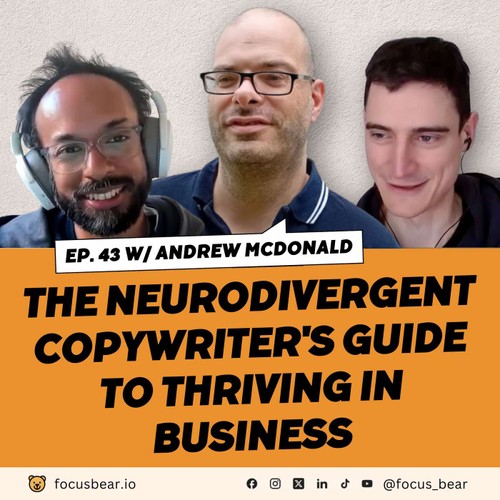
 Focus and Chill - productivity tactics for AuDHDers and other neurodivergent folks
Focus and Chill - productivity tactics for AuDHDers and other neurodivergent folks Episode 43: Andrew McDonald
Jan 20, 2024
45:26
Welcome to episode #43 We’re thrilled to be joined by Andrew McDonald today!
Andrew goes by the moniker, The Neurodivergent Copywriter. He helps neurodivergent entrepreneurs to build successful marketing outreach campaigns that honor who they are, allowing them to reach their true potential. Andrew is neurodivergent himself. He understands how challenging typical marketing strategies can be for neurodivergent individuals. So, he offers guidance in avoiding high-stress, sleazy, hard-sale strategies. Instead, Andrew focuses on building strong customer and client communities around businesses run by neurodivergent individuals, ensuring these businesses thrive and remain sustainable.
Welcome to the show Andrew!
Questions
- JN: Can you tell us about your experience with neurodiversity? When did you realize that you weren’t neurotypical? What challenges did you face? What is it like now?
- Always felt like he didn’t fit in
- But only identified in the last few years.
- Has had CPTSD for decades
- OCD has been a lifelong
- RSD
- Anxiety and depression
- Introverted
- Doesn’t mind being around people.
- But not his happy place
- Went against the common advice of building a business
- Until stumbling on a neurodivergent entrepreneur summit
- Able to find what was congruent with
- Skill set
- Personality
- Able to find what was congruent with
- Some things that didn’t work
- Fake it until you make it
- Cold prospecting
- E.g. not being a fan of cold emails
- Because of rejection sensitivity - there’s a lot of rejection in cold emails.
- Took a different route. Used the content / inbound marketing approach.
- E.g. not being a fan of cold emails
- Coping mechanisms
- Coping with stress
- Taking strategic breaks (a day or a couple of days)
- Meditation
- Awareness of mental state
- Self-compassion
- Got there through experimentation
- Coping with stress
- Until stumbling on a neurodivergent entrepreneur summit
- Always felt like he didn’t fit in
- JC: What "work" projects are you concentrating on?
- Works with ND entrepreneurs
- Because he had a tough journey himself with unhelpful neurotypical advice: “Reach 6 figures in 6 months working from home in your pajamas”
- Helps ND entrepreneurs build communities that know like and trust them - they’ll be better qualified, stick around for longer, and refer you
- Sustainable sales
- Gradual growth allows time to build up business systems
- Works with ND entrepreneurs
- JN: How about the rest of the time? What do you enjoy doing in your off time?
- Sport
- Sports addict. Watching sports every day
- Rugby league: St Helens
- Broncos fan
- Basketball
- Soccer
- Boxing
- Rugby league: St Helens
- Enjoys sports but finds it tougher as we get older.
- But the rest of the family isn’t into it
- Sports addict. Watching sports every day
- Movies
- Particularly old stuff
- Learning languages
- Spanish
- Speaks Italian and French
- Sport
- JC: What does your morning routine look like and how has it evolved over time?
- Wakes up around 10 am
- Espresso (coffee)
- Start work immediately (frees up the evening)
- Breakfast after 30 minutes
- Then back to work
- JN: What do you do to optimize productivity during your working hours?
- Espressos (multiple)
- Strategic breaks
- Taking day(s) off.
- An hour lunch break.
- Owe them to people you’re working with - to give them your 100% battery.
- Meditation
- COMMERCIAL BREAK
- JC: What is one habit you'd like to remove from your life (either a bad habit or one that takes up too much time)?
- Alcohol was causing issues - close to alcoholism
- Now has been sober for five years
- Sinclair Method
- Take naltrexone an hour or two before you drink
- Blocks the reward pathways
- Breaks the vicious cycle of alcohol
- Becomes like drinking any other liquid
- End up drinking less over time
- Take naltrexone an hour or two before you drink
- Vicious cycle: drinking to feel better but then the effects of drinking lead to feeling worse
- JN: How do you switch off at night?
- Listening to old radio comedies.
- Classical music
- JC: What resources (books, philosophies, apps, sensory toys) do you find most helpful for productivity and habit formation?
- Bluetak = an awesome fidget toy
- “The subtle art of not giving a f*ck” by Mark Manson
- Pete Best (5th Beatle) vs Mustaine (Metallica / Megadeth)
- JN: Where can people connect with you or find your work?
- andrewmcdonald.biz
- Free guide andrewmcdonald.biz/book
- Social media
- LinkedIn
- Uses moderately - otherwise becomes a trigger.
- LinkedIn
- JC: Do you have any final words or asks for our audience?
- If you find the typical strategies you’ve been taught don’t work (and you’ve given them a good shot), the problem might not be you, it might be the strategies.
- There are multiple ways to be successful. It’s important to enjoy the process.
